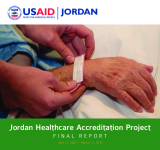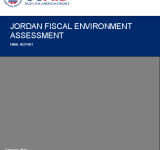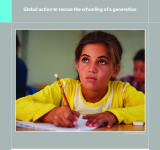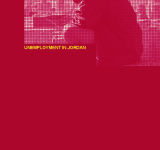primary
The report aims to provide an executive summary and major results and accomplishments;; lessons learned and challenges and opportunities of the Jordan Healthcare Accreditation Project (JHAP). The overall goal of the JHAP was to improve the health status of all Jordanians and quality and safety of healthcare services through accreditation. The project's methodology was assisting the Government of Jordan to adopt a regulatory framework for the health sector;; through the establishment of national and internationally recognized healthcare standards and accreditation. The key results of the project include an organizationally and financially sustainable accrediting agency in Jordan;; the Health Care Accreditation Council (HCAC);; an HCAC board with the appropriate skills to govern the agency and support from the Ministry of Health;; the Royal Medical Services;; the university hospitals;; and the Royal Court for accreditation. The report concludes with recommendations for the HCAC in areas such as financial sustainability;; credibility of the organization;; keeping the momentum and new business development and innovation. Some opportunities that the report suggests include expanding in the Middle East and North Africa region;; partnering with well-known quality organizations;; offering courses online and benchmarking subscriptions.
The assessment report is a final product of the Asia and Middle East Economic Growth Best Practices project (AMEG);; which is designed to support USAID missions in developing effective and efficient economic growth programs that address technical and strategic challenges. The report provides an introduction to Jordan's macroeconomic performance and structure and examines the field assessment's key lines of inquiry such as fiscal environment;; taxation;; customs and trade facilitation;; the energy sector;; policy analysis and political economic environment. It identifies the structure and performance of each inquiry and adds policy;; administrative;; and institutional environment;; and its challenges and opportunities.The report's concluding section outlines key challenges and opportunities;; and offers recommendations. Some of the findings include Jordan's lack of robust forum for soliciting and integrating input on economic policy issues from key stakeholders or the wider public and lack of institutional capacity to develop macroeconomic models. The report suggests facilitating national dialogue and consensus building on economic policy issues and building capacity to integrate stakeholder input.
The report assesses the practical challenges of education and schooling for the Syrian children in refugee camps in Jordan;; Lebanon and Egypt as the Syrian Crisis prolongs. It argues that ensuring the continued access to learning is an essential platform for protection;; social stabilization and economic recovery that the international community should not ignore. The report also includes important figures and statistics revealing the alarming situation of education and school. Some of the key statistics are the host-country school-age children compared to Syrian school-age children;; Syrian children enrolled in public schools in Lebanon and Jordan and school-age Syrian refugee children in and out of school by countries such as Iraq;; Egypt;; Turkey;; Jordan and Lebanon. The report concludes with four key recommendations to be undertaken by regional governments and their international partners so that the fundamental right to quality education can be guaranteed to the Syrian children.
This pilot study report was initiated by the European Training Foundation (ETF);; in close cooperation with the National Center for Human Resources Development (NCHRD) in Jordan;; in the framework of the ETF multiannual project Observatory Function Development in Jordan. The focus of this report is unemployment. However;; considering that unemployment information in itself should not be used or analysed in isolation from other indicators or data;; the report begins by providing an overview of the general labour market situation in Jordan. After the main data on employment by sector;; age;; gender and level of education are presented;; on the basis of the available information;; the specific cases of non-Jordanian employees and employment in the informal economy are highlighted as topics requiring special attention in the Jordanian labour market. In conclusion;; two groups of recommendations are proposed: (i) technical recommendations to main information providers for improving the quality of the information collected;; and (ii) a set of policy recommendations for tackling unemployment. These recommendations are intended to support policymakers in their commitment and willingness to adapt both the formal and informal education and training system and the whole labour market in Jordan.




